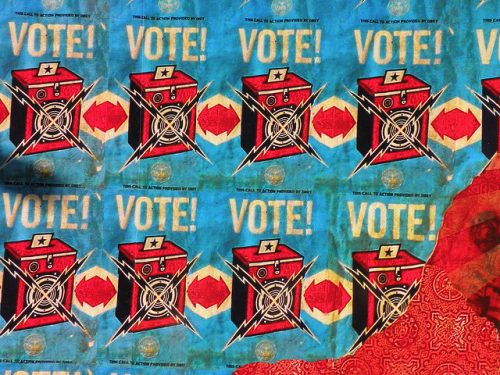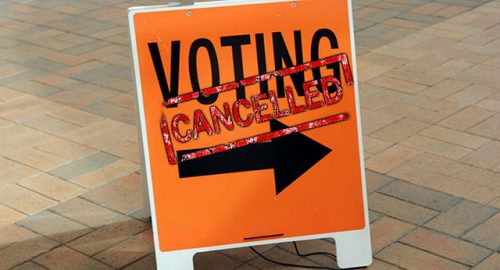Read more at There’s Research on That (here and here)
The U.S. midterm elections are upon us this week, and everyone is trying to get out the vote. This is important, since voter turnout in this country is relatively low, but we also have to remember that there are institutional reasons why turnout is low in some areas that have nothing to do with voters’ motivation. Commentators often talk about gerrymandering and voter suppression policies, but what do these look like in practice, and what kind of impact do they have? Social science research can show us.
Gerrymandering occurs when legislators redraw voting districts in order to concentrate their electoral dominance. Political sociologists have shown that full voting rights are not as guaranteed in the United States as in many other major democracies, especially for low-income voters and communities of color in the electoral process. For example, partisan gerrymandering reduced access to communication between ward residents, local nonprofits, and their political representatives in Chicago. There is also evidence it changed voters’ choices in Georgia.
- Frances Fox Piven and Richard A. Cloward. 2000. Why Americans Still Don’t Vote: and Why Politicians Want it that Way. Boston: Beacon Press.
- Robert Vargas. 2016. Wounded City: Violent Turf Wars in a Chicago Barrio. New York: Oxford University Press.
- V. Hood and Seth C. McKee. 2008. “Gerrymandering on Georgia’s mind: The Effects of Redistricting on Vote Choice in the 2006 Midterm Election.” Social Science Quarterly 89(1): 60-77.
Bureaucratic policies can also enforce voter suppression by making it harder for people to register and to vote. After the 2010 midterm elections, there was a wave of laws that seemed to bolster voting requirements, such as new ID laws and proof of residence. And while strengthening voter requirements may seem benign at first, these rules restrict access to people who are less likely to have identification and proof of residence — people of color, the elderly, and the poor. In essence, such laws make it harder for only some people to vote. Research suggests that Republican leadership and legislatures are more likely to push for these laws.
- Keith G. Bentele and Erin O’Brien. 2013. “Jim Crow 2.0?: Why States Consider and Adopt Restrictive Voter Access Policies.” Perspectives on Politics. 11(4): 1088-1116.
- William D. Hicks, Seth C. McKee, Mitchell D. Sellers, and Daniel A. Smith. “A Principle or a Strategy? Voter Identification Laws and Partisan Competition in the American States.” Political Research Quarterly 68(1): 18-33.
Policies like these show why it is especially important to stay connected with the politics and to help others to vote where you can. Regardless of your personal preferences, we have a collective responsibility to defend the democratic process for everyone.
Amber Joy Powell is a PhD student in sociology at the University of Minnesota. Her current research interests include punishment, sexual violence and the intersections among race, gender, age, and sexuality. Her work examines how state institutions construct youth victimization.
Neeraj Rajasekar is a PhD candidate in sociology at the University of Minnesota interested in the intersections of “diversity” discourses, racial factors, and cultural ideologies.
Caity Curry is a PhD student in sociology at the University of Minnesota. Her research interests include the sociology of punishment and social control, especially the causes and consequences of mass incarceration and mass supervision.



Comments 11
Connor Noah — March 31, 2020
The essay writing is the service which will increase the research road map of your. The https://collegessaywriters.com/bestessay-com-review/ also provides you the detail report of the service at the end.
justlearn — July 2, 2020
check this ultius reviews to manage the task.
James Martin — October 20, 2021
Political sociologists have shown that full voting rights are not as guaranteed in the United States.
Regards,
Personalised website design
americanforeversecurity — October 25, 2021
Bureaucratic policies have pointed out that full support rights are not guaranteed in the United States.
normanwolf — August 2, 2022
Any job has loopholes. This is an inevitable problem Elastic man is an exciting 3D rendering of Morty where you get to pinch and drag a man with a very flexible face. Make you feel funny and oddly satisfying.
Sawyer Holden — September 5, 2022
Thank you for sharing such great thoughts. I think You should write On magnesium powder supplier
Hannah Devis — September 30, 2022
I think almost every student faced the problem of writing papers for the university. To save your time and effort, use a written service. It will help you with any type of work from term paper, dissertation or essay to a discussion post. Use this site and you won't regret it. https://place-4-papers.com/write-my-discussion-board-post/
Nolan Charles — November 21, 2022
Nice Explanation Interesting read very helpful for me keep posting like this thanks !!
Olivia Jamy — February 28, 2023
Politics encourages illegal behavior by stealing people's votes, which they can easily use to influence the outcome of elections in favour of their political party.
PADI Rescue Diver Course
meoktwi — March 27, 2023
Thanks for sharing very good information. Your blog has some really cool information. you read the post about 먹튀검증 Impressed. I'll bookmark your blog and come back for the next article.
jinioa — September 25, 2023
Infor Inn is a dedicated platform for global readers where you can find updated and new articles on business and technology. We encourage versatile and well-versed writers to share their Guest Post and infographics with us to get it published on our site. Read and enjoy latest blogs here on every topic you are looking for.InforInn